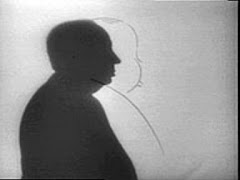Here's a definition that begins a book chapter I've written called 'Auteur Machines: Auteurism and the DVD'. The chapter will be published shortly in a great book called Film and Television After DVD, edited by James Bennett and Tom Brown, for Routledge Research in Cultural and Media Studies series:
Auteurism, like many other features of cinema, is a matter of supply and demand. It is a way of both making and experiencing films, and increasingly of selling them, in which the largest part of the control of the intellectual and creative work involved in the filmmaking process, or of the responsibility and credit for this, is actively taken up by or ascribed to the film’s director. Contemporary auteurism comprises a complex series of interrelated film production, marketing, and reception practices and discourses which are all underpinned by a shared belief in the specific capability of an individual agent – the director – to marshal and synthesize the multiple, and usually collective, elements of filmmaking for the purposes of individual expression, or to convey in some way a personal or, at least, “personalized” vision.
A much longer exploration of contemporary auteurist film culture will be appearing in the book I intend finally to be finishing over the summer. That's when I will voluntarily cease, for a while, to be a well-paid Film Studies lecturer, after eighteen long but good years in academia (at the University of Strathclyde, Glasgow, then at the University of Kent, Canterbury), and will hopefully get to spend some more time writing about film.
This book, to be called Directing Cinema: The New Auteurism, is one I've been working on for Manchester University Press for the last few years. It attempts an in-depth investigation of the ways in which contemporary film directors, their discourse, and discourse about them act in the contemporary global practices of film production, distribution and exhibition, and in contemporary film cultures more widely. Commercial developments in film production and marketing, especially since the 1970s (Neale 1981; Caughie 1981; Corrigan 1991), and geo-cultural, technological and structural developments since the 1990s have meant that a much larger number and a wider variety of directors than ever before acquire a public prominence that was once the preserve of established “auteurs” (Grant, 2000).
I consider film directors as agents, or subjects, who have direct, intentional and reflexive, if obviously not completely all determining, relationships to the cultural products they help to produce, as well as to their reception (Grant 2001). Following Judith Butler, I see agency as a “reiterative or re-articulatory practice, immanent to power and not as a relation of external opposition to power” (Butler 1993: 15). This means that, for me, while directors (as agents) make or direct films, by choosing, doing and saying (sometimes) original things, as individuals what they cannot make or “direct” is the discursive or conceptual framework of “directing” itself. In order to be seen as directors (and as particular kinds of directors), they can therefore only “re-make” or “re-direct,” or, cite or repeatedly perform, the kind of work that is socially constructed as being that of a “director,” the kind of work that we, the audience, want from directors (see also Grant 2002, for further theorizations of contemporary auteurism).
Circular, huh? It is, sort of, but it will hopefully also be productive and a take which may help to get discussions of film directing out of all sorts of historical, problematic, Film-Studies' impasses.
Anyway... I aim to unpack and unpick a lot of the above in future posts as I get to grips with finishing the book. But I will also be jotting down other less dense thoughts (!) about what film directors, nowadays, do and say.
© 2008 Catherine Grant
References:
- Butler, J. (1993) Bodies That Matter, London and New York: Routledge.
- Caughie, J. (ed) (1981) Theories of Authorship, London: British Film Institute.
- Corrigan, T. (1991) A Cinema Without Walls: Movies and Culture After Vietnam, New Brunswick: Rutgers University Press.
- Grant, C. (2000) ‘www.auteur.com?’, Screen, Vol. 41:1: 101-108
_______(2001) ‘Secret Agents: Feminist Theories of Women’s Film Authorship’, Feminist Theory 2:1: 113-130.
_______(2002) ‘Recognizing Billy Budd in Beau Travail: Epistemology and Hermeneutics of an Auteurist “Free” Adaptation’, Screen 43:1: 57-73.






No comments:
Post a Comment